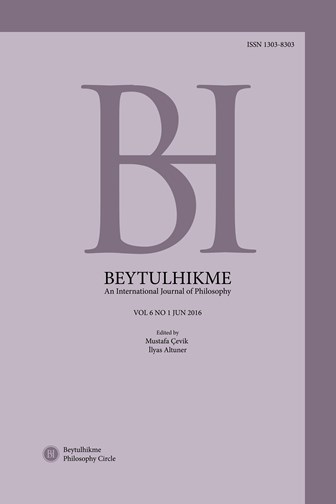Author :
Abstract
Elinizdeki makale, Heidegger filolojisinin dilsel zorluklarına (Gewaltsamkeiten) ilişkin genel bir tasvir sunarken, esasen Heidegger ontolojisinin temel kavramlarının ve yakın anlam alanlarının çevirisine yönelir: “Varlık”, “varolan”, “[var]dır”, “Hiçlik”, “dır-lık” vs.. Ana eksininde “Heidegger nasıl çevrilmeli? sorusu yattığından bu soruya cevap arayışındadır. Elinizdeki makale, Metafiziğe Giriş’te işlenen temel kavramların Türkçe karşılıklarının genel sonuçlarına ilişkin “yeniden düşünme”nin yol açtığı bilimsel bir ‘revizyon’dur ve Türkçe terminoloji çalışmalarına doğrudan katkı olarak görülmelidir. Konumundan dolayı Metafiziğe Giriş metnine aracısız dayanan bu esas yönelmede hedef, Heidegger’i Türkçe konuşturabilmenin yollarını arayıp Türkçede oluşabilecek bir Heidegger filolojisi için yine Türkçenin kendi söz varlığının yakın/uzak dil ve kültür mekanından yeni perspektifler ve öneriler sunmaktır.
Keywords
Abstract
As the current study gives a general description on ‘Gewaltsamkeiten’ of Heidegger’s philology, it is aimed at the translation of the basic concepts of Heidegger’s and their nearly field of meaning: “Das Sein”, “das Seiende” “seiend”, “das Nichts”, “das Ist” etc. In its main axis, the question “How to translate Heidegger?” is inherent, as well as in search of the reply to this question. This study is a scientific ‘revision’ that leads to a “trotzdem denken” on the general results of the Turkish equivalences of the basic concepts treated in the Introduction to Metaphsics and also should be considered as a first-hand contribution to Turkish terminological studies. The target at this direction that because of its position is based on the text ‘Introduction to Metaphysics’ is to search the ways how one lets Heidegger speak Turkish and to give new perspectives and proposals for an in Turkish building Heidegger’s philology from the nearly/far space of language and culture of word being of Turkish language.
Keywords
- Braver, L. (2014). Heidegger: Thinking of Being. Cambridge: Polity.
- Christen, F. (2013). Heideggers Philologie. Textkritische Beiträge, 14, 23-36.
- Courtine, J. F. (2007). L’Introduction à la Metaphysique de Heidegger. Paris: J. Vrin.
- Figal, G. (2007). Einleitung. Heidegger Lesebuch (ed. G. Figal). Frankfurt a. Main: V. Klostermann Verlag, 9-43.
- Figal, G. (2011). Martin Heidegger zur Einführung. Hamburg: Junius Verlag.
- Figal, G. (2013). Martin Heidegge: Phänomenologie der Freiheit. Tübingen: Mohr Siebeck Verlag.
- Heidegger, M. (1983). Anhang. Zur Kritik der Vorlesung. Heidegger, M. Einfüh- rung in die Metaphysik (ed. P. Jaeger). Frankfurt a. Main: V. Klostermann Verlag, 217-230.
- Heidegger, M. (1991). Grundbegriffe (ed. P. Jaeger). Frankfurt a. Main: V. Kloster- mann Verlag.
- Heidegger, M. (1998). Einführung in die Metaphysik. Tübingen: Niemeyer Verlag.
- Heidegger, M. (2013). Olmaya Bırakılmışlık (çev. M. Keskin). İstanbul: Avesta Yayınları.
- Heidegger, M. (2014). Metafiziğe Giriş (çev. M. Keskin). İstanbul: Avesta Yayınları.
- Mersch, D. (2013). Die Stile Martin Heideggers. Freiburg & Münich: Alber Verlag.
- Polt, R. (2001). A Companion to Heidegger’s Introduction to Metaphsics. New Haven & London: Yale University Press.
- Polt, R. (2003). Einführung in die Metaphysik: Eine Erkundung der Physis und ihrer Entmachtung. Heidegger-Handbuch: Leben-Werk-Wirkung (ed. D. Thomä). Stuttgart: Metzler Verlag, 174-181.
- Pöggeler, O. (1959). Sein als Ereignis: Martin Heidegger zum 26. September 1959. Zeitschrift für philosophische Forschung, 13, 597-632.
- Pöggeler, O. (1983). Der Denkweg Martin Heideggers. Pfullingen: Neske Verlag.
- Riedel, M. (1990). Hören auf die Sprache: Die Akroamatische Dimension der Hermene- utik. Frankfurt a. Main: Suhrkamp.
- Tietz, U. (2013). Heidegger. Stuttgart: Reclam Verlag.
- Trawny, P. (2003). Martin Heidegger. Frankfurt a. Main: Campus Verlag.
- Vetter, H. (2014). Grundriss Heidegger: Ein Handbuch zu Leben und Werk. Hamburg: Felix Meiner Verlag.
- von Hermann, F.-W. (1994). Wege ins Ereignis: Zu Heideggers “Beiträgen zur Philosop- hie”. Frankfurt a. Main: V. Klostermann Verlag.
- Waldenfels, B. (2010). Fenomenolojiye Giri. (çev. M. Keskin). İstanbul: Avesta Öz: Elinizdeki makale, Heidegger filolojisinin dilsel zorluklarına (Gewaltsamkeiten) ilişkin genel bir tasvir sunarken, esasen Heidegger ontolojisinin temel kavramlarının ve yakın anlam alanlarının çevirisine yönelir: “Varlık”, “varolan”, “[var]dır”, “Hiçlik”, “dır-lık” vs.. Ana eksininde “Heidegger nasıl çevrilmeli? sorusu yattığından bu soruya cevap arayışındadır. Elinizdeki makale, Metafiziğe Giriş’te işlenen temel kavramların Türkçe karşılıklarının genel sonuçlarına ilişkin “yeniden düşünme”nin yol açtığı bilimsel bir ‘revizyon’dur ve Türkçe terminoloji çalışmalarına doğrudan katkı olarak görülmelidir. Konumundan dolayı Metafiziğe Giriş metnine aracısız dayanan bu esas yönelmede hedef, Heidegger’i Türkçe konuşturabilmenin yollarını arayıp Türkçede oluşabilecek bir Heidegger filolojisi için yine Türkçenin kendi söz varlığının yakın/uzak dil ve kültür mekanından yeni perspektifler ve öneriler sunmaktır. Anahtar Kelimeler: Filoloji, temel kavramlar, varlık, varolmaklık, Heidegger terminolojisi, Türkçe kavramlar.





